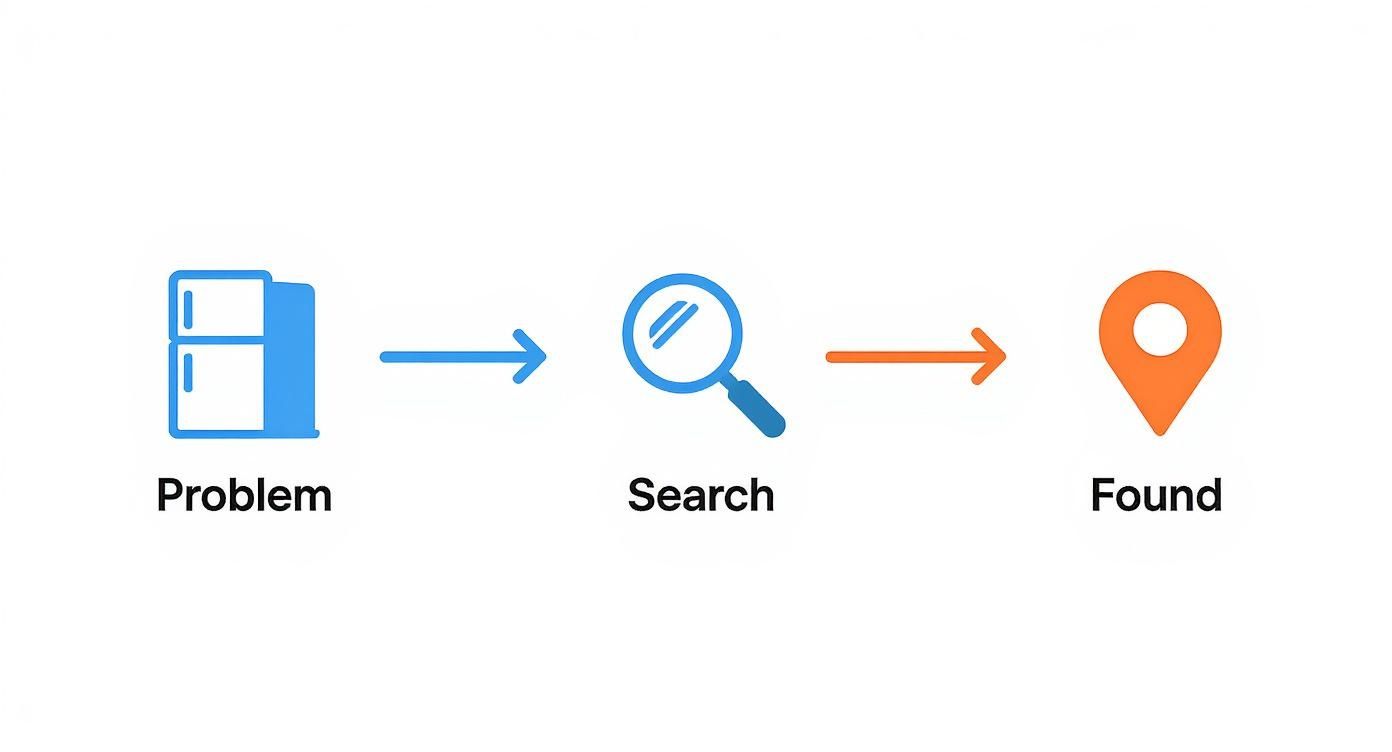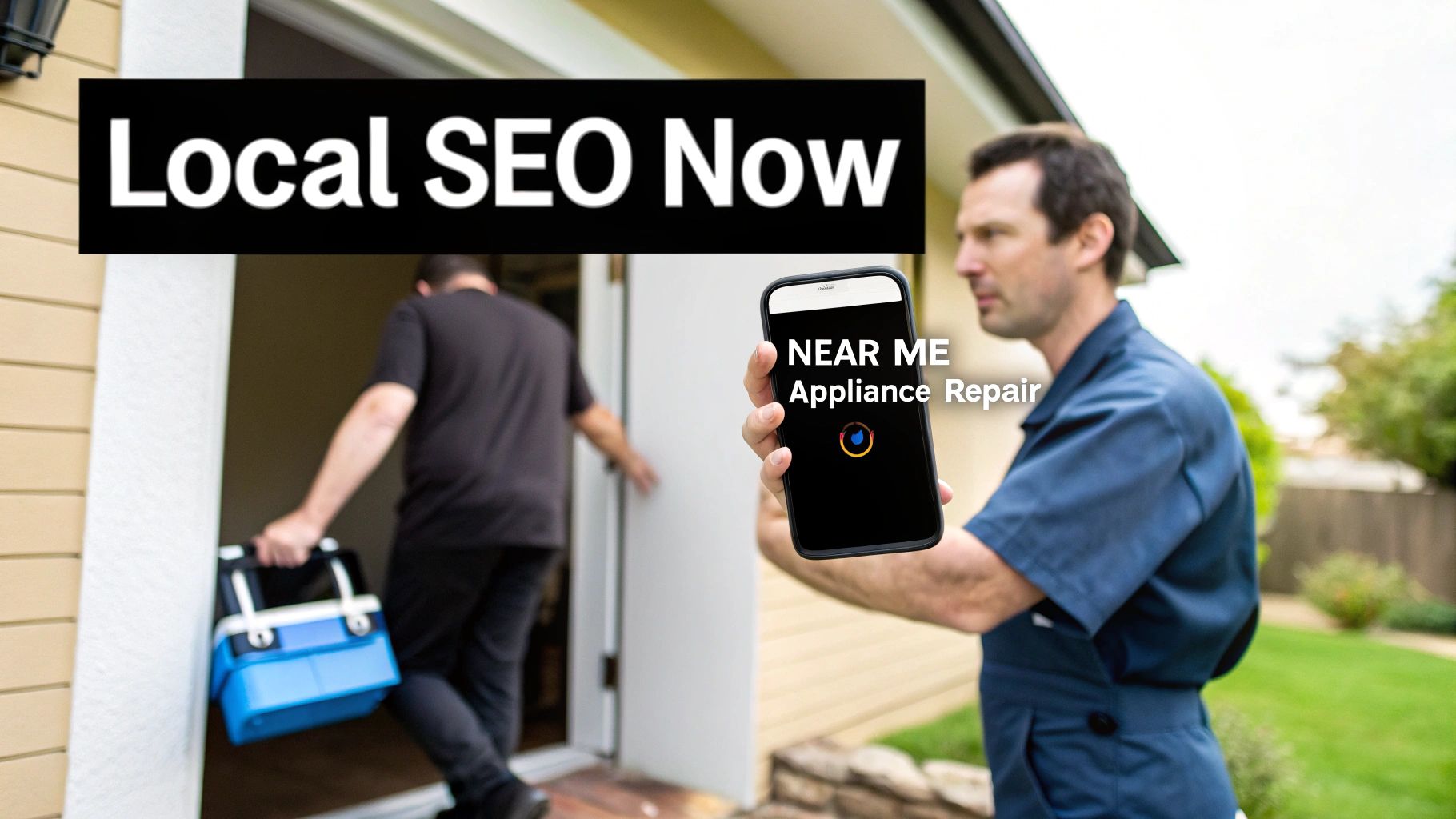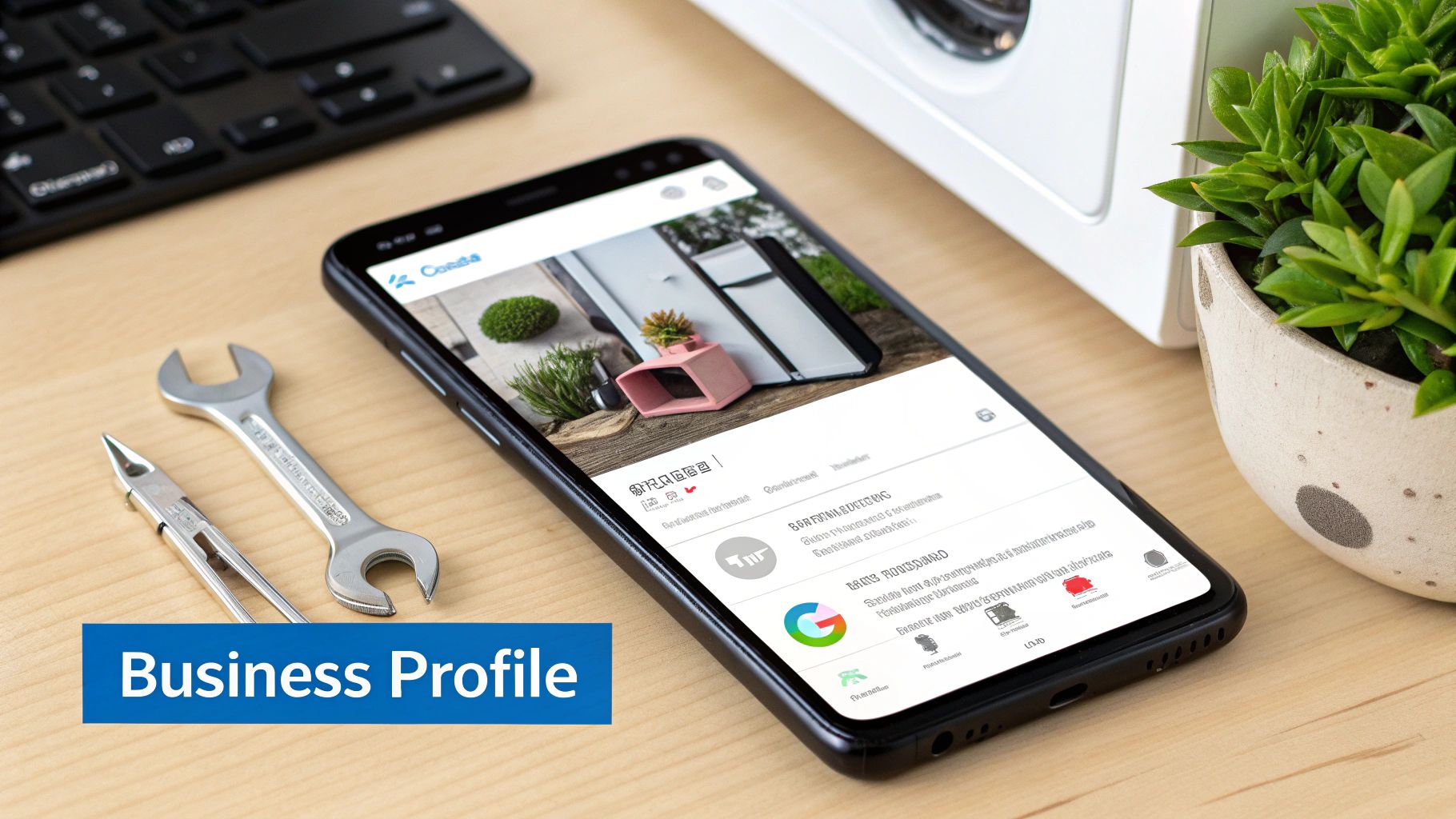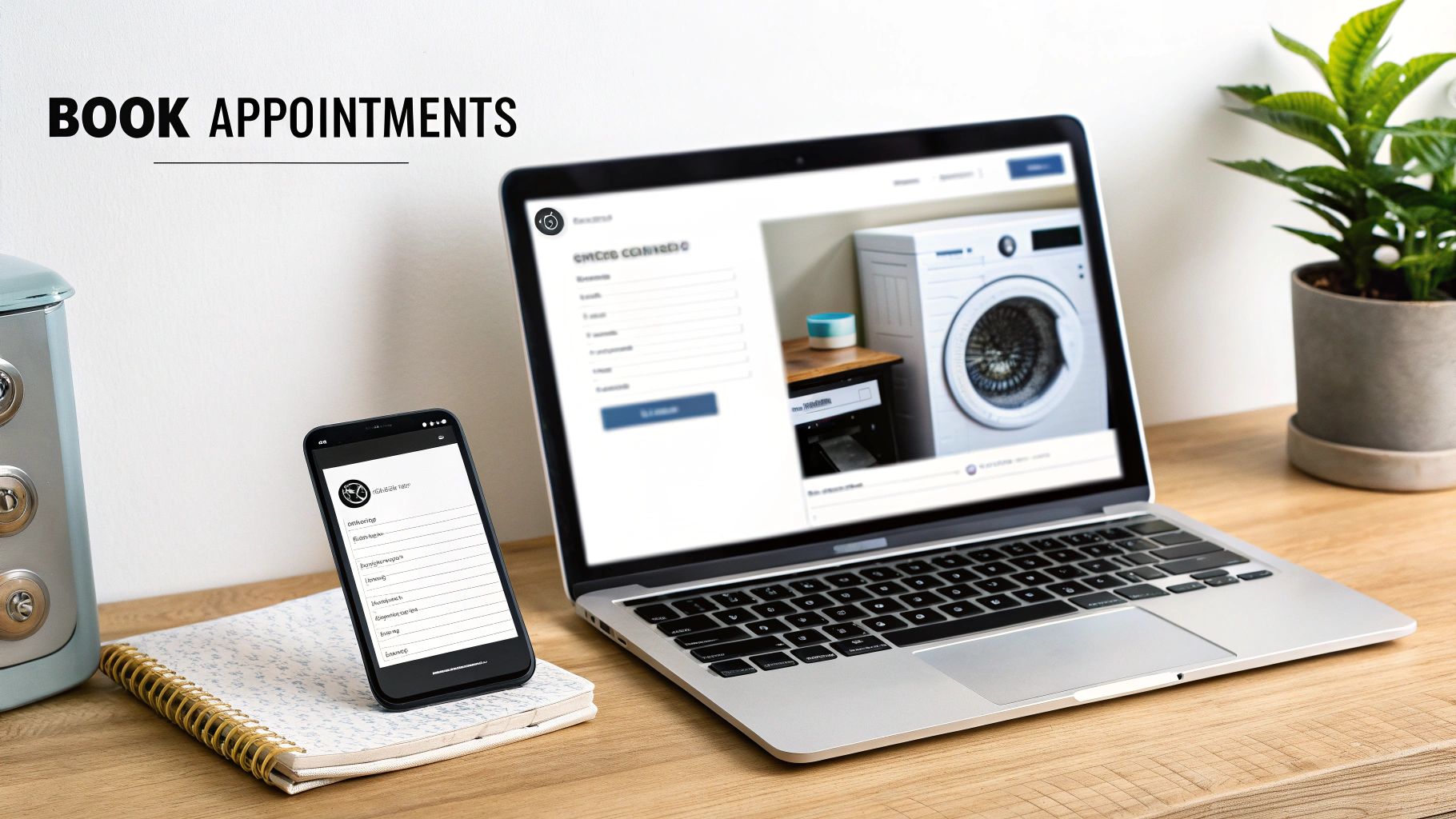When a fridge dies or an oven gives up, homeowners don't casually browse—they need a fix, and they need it now. This is where SEO for appliance repair becomes your best tool. It’s about showing up at the exact moment someone in your town is searching for help.
Think of it as the modern version of being the first, most trusted number in the phone book for a local emergency.
Why Local SEO Is Your Best Technician
Nobody's flipping through the Yellow Pages anymore. A broken dishwasher today means a frantic smartphone search for "emergency washer repair near me." This is the world we live in—driven by urgent, local searches.
When a potential customer types ‘oven repair in Dallas,’ they aren't just looking around. They're ready to book a service call. Your only job is to be the first name they see.
The Surge in "Near Me" Searches
The appliance repair industry is growing. People would rather fix their expensive units than replace them. The global market for home appliance repair was valued at $18.2 billion in 2023 and is on track to hit $28.5 billion by 2032.
This means more customers are actively looking for reliable technicians.
And they are looking online. A good online presence does more than just get your name out there; it builds instant credibility. When you're inviting a stranger into your home, trust is everything. Ranking at the top of Google is that important first handshake.
In Short: A homeowner with a broken appliance has an urgent, location-specific problem. Local SEO puts your business directly in their sight.
The journey from a broken appliance to a booked service call happens fast. This infographic breaks down how a customer finds you.

As you can see, being easy to find online is the critical link between a customer's problem and your technician arriving at their door.
Local SEO vs. Traditional Advertising for Appliance Repair
Let's quickly compare old-school methods with a modern SEO approach. It’s clear which one gives you a better return.
| Feature | Local SEO | Traditional Ads (e.g., Yellow Pages, Flyers) |
|---|---|---|
| Targeting | Hyper-focused: Reaches customers in your service area who are actively searching for repairs right now. | Broad & untargeted: Hits everyone in a zip code, whether they need you or not. Low conversion rate. |
| Cost | Higher upfront ROI: An investment in a long-term asset that generates leads consistently over time. | Recurring cost: You stop paying, the ads disappear. No lasting value. |
| Timing | On-demand: You appear at the exact moment a customer has an urgent need. | Passive: Relies on the customer keeping a flyer or phone book and remembering you. |
| Trust | Builds credibility: Positive reviews, high rankings, and a professional online presence create instant trust. | Low trust: Often seen as junk mail or just another name in a long list. |
| Measurability | Fully trackable: You can see exactly how many calls, clicks, and leads your efforts generate. | Hard to measure: Difficult to know if a flyer or a print ad actually led to a service call. |
While traditional ads had their day, local SEO is built for how customers solve problems today. It’s more efficient, more targeted, and delivers a much stronger return.
How does local search build trust?
Think about other local emergencies. When someone is locked out of their car, they need to discover reliable emergency auto locksmith help near you immediately. They need a local pro who can get there fast.
The same logic applies to appliance repair. A solid local SEO strategy helps you show up with the right trust signals:
- Proximity: You appear in their neighborhood searches, confirming you're a local business.
- Reviews: Star ratings and testimonials show that neighbors trust your work.
- Information: A complete profile with your hours, services, and phone number answers their key questions.
Nailing your local search appearance is the foundation of a winning strategy. We dive deeper into this in our guide on https://clicksgeek.com/local-maps-seo/. A strong presence there makes you the obvious choice.
Finding Keywords Your Customers Actually Use

Great SEO for appliance repair is about getting inside your customer's head. You have to use the exact phrases they type into Google when their dishwasher is flooding the kitchen.
Forget technical jargon. A stressed homeowner isn't searching for "refrigeration coil diagnostics." They're typing "fridge not getting cold" or "LG refrigerator repair near me." Your first job is to build a list of keywords that captures that immediate need.
The Three Core Keyword Types
To get the right kind of customers—the ones ready to book a service call—focus on three main keyword categories.
-
Problem-Based Keywords: These are direct. A customer knows something’s broken but not why. Think "leaking dishwasher," "oven won't heat up," or "dryer making loud noise."
-
Brand-Specific Keywords: Many customers know what brand they own. You'll see searches like "Samsung washer repair Houston" or "Whirlpool oven technician."
-
Hyper-Local Keywords: This is where you zero in. Targeting specific neighborhoods or towns with phrases like "appliance repair downtown Austin" is pure gold for local SEO.
Pro Tip: The best keywords often combine all three. A search for "emergency GE refrigerator repair in Brooklyn" tells you the problem, brand, location, and urgency. That’s a hot lead.
How to Find High-Intent Keywords for Free
You don't need expensive software to get started. Some of the best keyword research tools are free and easy to find.
Start with Google Autocomplete
Just go to Google and start typing a service, like "washing machine repair." Google's suggestions are a direct look into what real people are searching for.
- "washing machine repair near me"
- "washing machine repair cost"
- "GE washing machine repair"
Every relevant phrase you see is worth adding to your list.
Check the "People Also Ask" Box
When you search for a term, scroll down to the "People Also Ask" (PAA) section. This is a goldmine for content ideas and understanding your customers' specific questions.
What is a long-tail keyword?
This sounds complicated, but it's not. A long-tail keyword is just a longer, more specific search phrase. Instead of "appliance repair," a long-tail version would be "emergency Maytag dishwasher repair in San Diego."
Fewer people search for that exact phrase, but the ones who do are much more likely to hire you. Their intent is crystal clear. Focusing on these is a shortcut to quality leads.
For a more in-depth look at keyword tools, our guide on how to use Google's Keyword Planner is a great next step.
What is keyword intent in SEO?
Keyword intent is simply the "why" behind a search. Is someone looking for information ("how to fix a leaky faucet"), or are they ready to hire someone ("plumber near me")?
For your business, target commercial intent keywords. These are phrases that signal someone is ready to pay. Look for terms that include modifiers like:
- repair
- service
- technician
- fix
- [city name] or "near me"
These words are strong indicators that the searcher is looking to hire a pro.
Don't Forget Negative Keywords
Knowing what you don't want to rank for is just as important. Negative keywords are terms you tell Google to ignore. This is crucial for not wasting money on ads or attracting the wrong website visitors.
For any appliance repair business, you’ll want to filter out the DIY crowd. Common negative keywords to add are:
- "DIY"
- "free"
- "parts" (unless you sell them directly)
- "manual"
- "schematic"
- "how to"
Adding these ensures you're showing up for people who want to hire a professional, not become one.
Your Google Business Profile Is Your Digital Handshake
If you do just one thing, get your Google Business Profile (GBP) right. For an appliance repair business, this is everything. It's your digital storefront, business card, and billboard all rolled into one.
It's the ticket to getting into that "map pack" when someone searches for "refrigerator repair near me." A neglected profile is like a disconnected phone line. A well-managed one is a machine built to make your phone ring. This is the bedrock of your entire SEO for appliance repair strategy.
Nailing the Basics for Maximum Impact
Getting the small details right on your GBP is essential. Google uses this info to figure out who needs you and where they are.
Here’s where to focus:
- Primary Category: This must be "Appliance repair service." Don't pick "Home services" or something generic. This one choice tells Google exactly what you do.
- Service Areas: List the specific towns, zip codes, and neighborhoods you serve. This is how you show up for a search in a suburb 10 miles away.
- Hours of Operation: Be honest. If you offer 24/7 emergency calls, put it down. If you close at 5 PM, your profile needs to say that. Nothing gets you a one-star review faster than not answering during listed "open" hours.
Getting these fundamentals right is the starting point. A complete profile gives both Google and customers the confidence to call. For a deeper dive, our guide on local SEO services for small businesses is a great next step.
How to Turn Your Profile into a Call Magnet
Okay, the basics are done. Now it's time to add layers that build trust and push people to contact you. This is how you beat the competition who set up a profile and never touched it again.
In Short: An active Google Business Profile signals to Google that you are an engaged, operational business, which can improve your visibility.
Use Google Posts
Think of Google Posts as free mini-ads on your profile. They’re perfect for sharing things like:
- Deals: "$25 Off Your Next Service Call This Week!"
- Tips: "Quick tip: Clean your dryer's lint filter after every use."
- Services: "Did you know we specialize in Sub-Zero refrigerator repair?"
These posts expire, so aim for a new one every week or so. It keeps your profile fresh.
Add High-Quality, Real Photos
People want to see who they're letting into their homes. Your photos are a huge trust signal. Get clear shots of:
- Your team in uniform.
- Your branded service vans.
- You or your techs working on an appliance (with customer permission).
Real photos show you're a legitimate, professional operation. Skip the generic stock photos—they can hurt your credibility.
Get Granular with Your Services
This might be the most powerful, underused feature on GBP. Don't just list "Appliance Repair." List out every single thing you do. The more specific you are, the more searches you'll show up for.
Add individual services like:
- Ice maker repair
- Dryer vent cleaning
- Washing machine drum replacement
- Oven thermostat calibration
- Dishwasher motor repair
- Samsung refrigerator service
- LG dryer repair
When someone's problem is "LG dryer not heating," having that exact phrase listed as a service gives you a massive leg up.
The appliance repair market is a $4.5 billion industry in 2024. More people are fixing high-end and smart appliances instead of buying new ones. Listing your specializations helps you capture these high-value customers.
Building a Website That Actually Books Appointments

Your Google Business Profile gets you noticed, but your website closes the deal. It’s your virtual storefront and best salesperson, working 24/7. When a homeowner clicks from Google Maps, your site has seconds to prove you're the right pro.
Smart SEO for appliance repair meets great design here. A website must anticipate customer needs and guide them straight to booking a service. The goal is to make it incredibly easy for someone in a panic to hire you.
Create Pages for Every Service and Town
One of the biggest mistakes is cramming everything onto a single "Services" page. To succeed in local search, you have to get specific.
This means you need dedicated pages for:
- Each Appliance: A separate page for "Refrigerator Repair," "Oven Repair," "Dishwasher Repair," etc.
- Each Location: If you cover multiple towns, create pages like "Appliance Repair in Springfield" and "Washer Repair in Shelbyville."
This strategy is a game-changer. It helps you rank for specific, high-intent searches like "Whirlpool oven repair near Springfield."
In Short: A specific page for a specific need signals to Google and customers that you're the local expert they need.
Answer Important Questions Immediately
When someone’s dishwasher is flooding their kitchen, they aren't reading your company’s life story. They have urgent questions, and your homepage needs to answer them the second it loads.
Make sure these three things are clear right at the top:
- What you do: "Expert Appliance Repair for All Major Brands."
- Where you do it: "Serving Springfield, Shelbyville, and North Haverbrook."
- How to contact you: A huge, clickable phone number and a "Book Online Now" button.
A simple "Why Choose Us" section or a quick FAQ can handle questions about service fees, brands you service, and your warranty. Transparency builds instant trust.
Design for Mobile Phones First
Most emergency repair searches happen on a smartphone. The customer is likely standing right in front of the broken appliance. If your website is hard to use on a small screen, you've lost them.
A mobile-first design is non-negotiable. This means:
- Your phone number is a big, tappable button at the top.
- Contact forms are short and easy to fill out.
- Text is large enough to read without zooming.
- The site loads fast.
Research shows 49% of users use their smartphones to compare prices for local services. If they can't find what they need in seconds, they’ll call your competitor.
How should I structure my appliance repair website?
Think of your website's structure as a simple roadmap for a stressed-out customer. It needs to be logical and easy to navigate.
Here’s a great starting point:
- Homepage: Your digital handshake. Instantly tell visitors what you do, where, and how to book.
- Service Pages: A unique page for each appliance you fix.
- Location Pages: A dedicated page for each key town or neighborhood you serve.
- About Us: Keep it brief. Build trust with a team photo and a short story.
- Contact Us: Your phone number, a simple form, and a map of your service area.
- Reviews/Testimonials: Show off 5-star reviews to build social proof.
This structure helps customers and makes it easy for Google to understand and rank your site. The small home appliance repair market is growing, a trend you can read more about in this small home appliances repair market analysis.
How to Get More Reviews and Build Local Trust

In the repair business, trust is everything. A customer is letting you into their home. They need to know you're reliable before they call. For most people, that gut check comes from your online reviews.
A steady flow of 5-star reviews on your Google Business Profile is a huge signal to Google that you're a top player. It's one of the biggest factors in ranking in the local map pack. This is where happy customers become your best marketing tool.
Making It Easy to Leave a Review
The secret: most happy customers are willing to leave a review. The problem is they're busy or it feels like a hassle. Your job is to make it ridiculously easy for them.
This simple process works wonders:
- Wait for the right moment. Ask right after you've fixed their problem and they're happy.
- Send a single, friendly follow-up. A text message is usually best. Something like, "Hi [Customer Name], it's [Your Name] from [Your Company]. If you have a moment, we'd appreciate your feedback here: [Direct Google Review Link]."
- Don't be a pest. One polite request is all you need.
In Short: The easier you make it for a happy customer to leave a review, the more likely they are to do it.
What should I do about a negative review?
First, take a deep breath. A bad review is not the end of the world. How you respond is what really matters. Research shows that 53% of customers expect a business to reply to a negative review within a week.
Here’s a good formula for responding:
- Acknowledge and apologize. Start with, "We're so sorry you had this experience."
- Stay professional. Never argue or make excuses, no matter how unfair the review seems.
- Take it offline. Say, "Please call us at [Phone Number] so we can learn more and make this right."
This approach shows potential customers that you stand by your work and care about customer satisfaction.
Understanding Local Citations and NAP Consistency
Let's discuss another trust signal Google loves: local citations. A citation is any online mention of your business's Name, Address, and Phone number (NAP).
Think about directory sites like Yelp or Angi. Every time your business NAP is listed correctly, it reinforces to Google that you are a legitimate local business.
The golden rule is NAP consistency. Your business name, address, and phone number need to be exactly the same everywhere online.
- Is your address "Main St." or "Main Street"?
- Do you use "Suite 101" or "#101"?
Pick one format for everything and stick to it. Inconsistencies can confuse Google and hurt your local ranking. For more tips on building a trustworthy presence, it’s worth looking into some proven online reputation management strategies.
Common Questions About SEO for Appliance Repair
https://www.youtube.com/embed/muXfiWH_XdY
Diving into SEO for appliance repair always brings up a few key questions. Here are some of the most common ones I hear from appliance repair pros, with straight, no-fluff answers.
1. How long does SEO take to work for an appliance repair company?
This is the big one. The honest answer is: it depends.
You can often see early wins from your Google Business Profile—like more calls or map views—in as little as 2-3 months. This is especially true if you get a quick burst of fresh reviews.
However, ranking on the first page for keywords like "refrigerator repair" in a competitive city is a longer game. You should be prepared for 6-12 months of consistent work. SEO is a marathon, not a sprint.
A few things can affect the timeline:
- Local Competition: Are there a dozen other repair companies already on Google?
- Website Age: An older website generally has a leg up on a new one.
- Consistency: Are you regularly getting reviews and posting updates? Sticking with it is key.
In Short: Look for early signs of life in a few months, but plan for a 6 to 12-month journey to lock in top rankings.
2. Is a blog necessary for my appliance repair website?
While you don’t absolutely need a blog to get service calls, it's a massive long-term advantage. Think of it as your secret weapon for proving you're the expert.
You don't need to write a novel. Just create simple articles that answer questions homeowners are typing into Google.
For instance, you could write posts like:
- "Why is My Dishwasher Not Draining? A Quick Troubleshooting Guide"
- "3 Signs Your Dryer Is Overheating"
- "My Refrigerator Stopped Getting Cold. What's Going On?"
This kind of content is gold. It attracts people in the research phase, builds trust, and helps your site rank for a wider net of keywords.
3. What's more important: my website or my Google Business Profile?
For getting the phone to ring right now, your Google Business Profile (GBP) is king.
It’s what shows up in the Google Maps "local pack" for urgent "appliance repair near me" searches. That's where most of your immediate leads will find you.
Your website is the home base that supports your GBP. It’s where you can go into more detail, build long-term authority, and give customers a place to learn about your services and warranty.
My advice is always the same: Nail your GBP first. Fill out every section, get reviews, and post updates. Then, turn your focus to building out your website with great service and location pages.
Ready to stop worrying about where your next service call is coming from? At Clicks Geek, we build SEO strategies that make your phone ring. Let's talk about growing your appliance repair business.
Is Your Business Ranking in Google Maps?
Turn Google Maps into a Lead Engine w/ Clicks Geek’s AI-powered local SEO. 3,000+ clients served. Our proprietary, fully done-for-you Maps SEO system handles everything—keyword targeting, local optimization, content, reviews, and ranking strategy—automatically.






